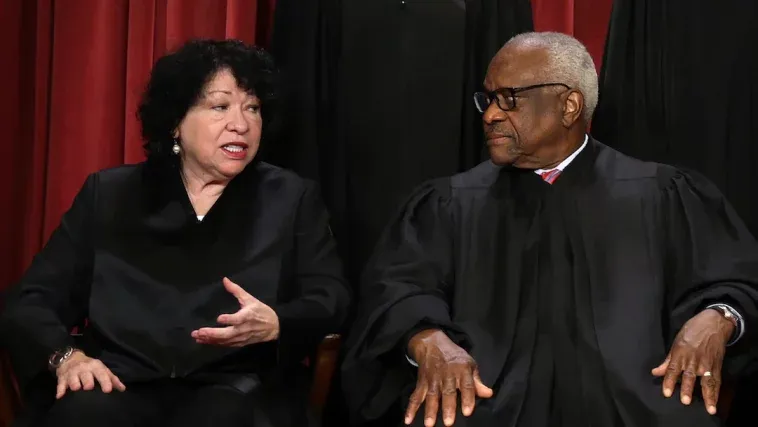(Daily Wire) Liberal Supreme Court Justice Sonia Sotomayor declined to recuse herself from multiple copyright infringement cases involving book publisher Penguin Random House despite having been paid millions by the firm for her books, making it by far her largest source of income, records show.
In 2010, she got a $1.2 million book advance from Knopf Doubleday Group, a part of the conglomerate. In 2012, she reported receiving two advance payments from the publisher totaling $1.9 million.
In 2013, Sotomayor voted in a decision for whether the court should hear a case against the publisher called Aaron Greenspan v. Random House, despite then-fellow Justice Stephen Breyer recusing after also receiving money from the publisher. Greenspan was a Harvard classmate of Mark Zuckerberg’s who wrote a book about the founding of Facebook and contended that Random House rejected his book proposal and then awarded a deal to another author who copied his book and eventually turned it into the movie The Social Network.
In 2017, Sotomayor began receiving payments each year from Penguin Random House itself, which continued annually through at least 2021, the most recent disclosure available, and totaled more than $500,000. In all, she received $3.6 million from Penguin Random House or its subsidiaries, according to a Daily Wire tally of financial disclosures.
In October 2019, children’s author Jennie Nicassio petitioned the Supreme Court to hear her lawsuit against Penguin Random House alleging that the book publisher had copied her book by selling one that was nearly identical. On the same day that the petition was distributed to the justices, Sotomayor received a $10,586 check from the publisher.
On February 24, 2020, the Supreme Court voted not to hear the case, denying the “writ of certiorari” and meaning that the case would remain where it left off — with a circuit court having found in the publisher’s favor. Sotomayor’s next check, coming in May of that year, was her largest ever from the parent company, at $82,807.
The Supreme Court does not reveal how individual justices vote when it comes to “cert,” but it does note when they recuse, which Sotomayor did not. Her decision not to recuse is particularly notable because Breyer again recused. Breyer received payments from Penguin Random House or Knopf each year, which he seemingly viewed as a conflict, even though he received only a tenth of the amount — $340,000 during the same time period — as Sotomayor (Breyer’s wife also wrote a book for the company).
The Penguin Random House money dwarfed the pay that Sotomayor received from the court and made up all of her reported outside earned income, with the exception of $6,000 in payments from groups — some of which related to her book — and a $5,000 “option fee,” which typically relates to books, according to the disclosures. The publisher also footed the bill for her to speak to various groups. Breyer, by contrast, would typically have those groups foot the bill.
Lawyers for Nicassio made a compelling argument that her case was worthy of being taken up by the Supreme Court. Nicassio wrote a book called “Rocky” which “tells the story of a little evergreen tree named Rocky who dreams of becoming the Rockefeller Center Christmas tree and embarks on an adventure toward that goal” against all adversity, getting advice from a mentor and facing attack by other plants, they wrote. Penguin Random House then published a book called “Albert” in which all of the same occurs, with the name of the Christmas tree changed. The lawyers said “Albert” even lifted key pieces of language from “Rocky,” and that the publisher had legally conceded that the work was copied.
The lawyers said that the Third Circuit found against Nicassio anyway because of a rule used in a handful of circuits in which a work is not considered wrongfully copied if similar elements would “naturally flow” from a “simplified version of the original plot.” In other words, taking for granted that there is a puny evergreen that wants to become the Rockefeller Center Christmas tree, it would not be surprising that multiple authors would each imagine the tree facing adversity — setting aside the obvious similarities of the premise itself.
The rule tightly construing what constitutes copyright infringement created a problem that was ripe for resolution by the Supreme Court, the lawyers argued, because the rule used by the Third Circuit was “radically different” from the one used by other circuits. “In the majority of the Circuits, the opposite outcome would have occurred,” they wrote. A Supreme Court ruling would serve to unify the understanding of the law.






